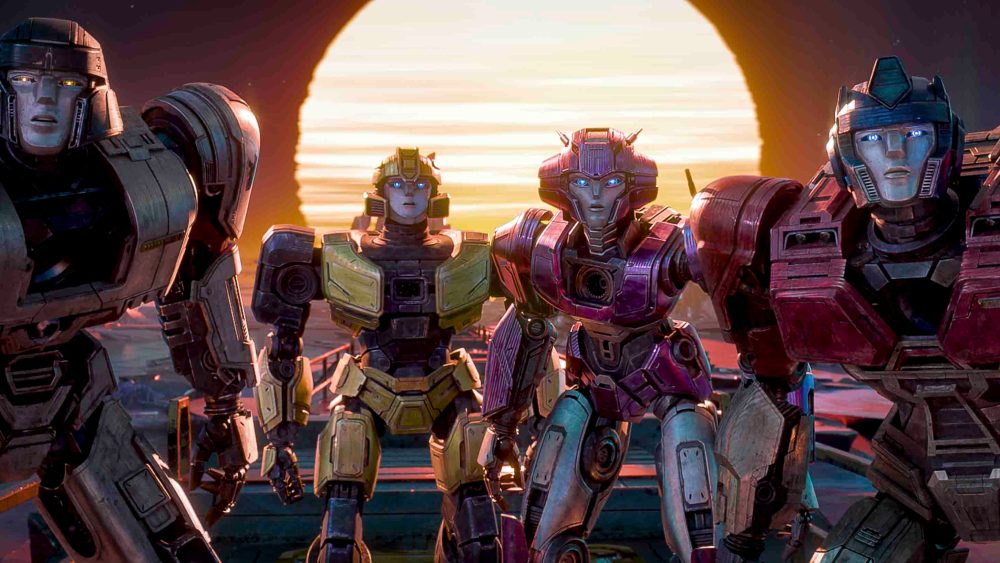‘Transformers One’ Composer on Quavo and Ty Dolla Sign’s ‘If I Fall’
“Transformers One” director Josh Cooley wanted an end credits song that captured the tone of his new animated feature. He had already enlisted composer Brian Tyler to compose the film’s score, and as they were putting the finishing touches together, Tyler was simultaneously juggling other projects and on the cusp of releasing his new immersive audio-visual project “Are We Dreaming.”
Cooley happened to be in the studio watching clips from “Are We Dreaming” and suggested taking the theme and turning it into a song. Tyler immediately got to work, pulling material from his audio-visual project. It started as an instrumental with influences of “trap, hip hop, leading into the momentum of a rock song,” explains Tyler. Once he had that, he came up with a few verses and even sang on the chorus for the work-in-process. The producers sent the song to Quavo. “He said, ‘I’m down. Let me go into the studio.’” Tyler adds, “We talked about the lyrics and what the song and movie meant.”
With Ty Dolla Sign, Tyler had previously collaborated with him on the 2014 song “Shell Shocked.” Says Tyler, “I talked to him and he really related to the idea of friends who become enemies.”
The film’s end credit song, “If I Fall,” came together featuring a big, soaring chorus. “It’s totally heartfelt,” says Tyler who also sings on the track and serves as the song’s producer. “It’s an anthem to stand up, and despite whoever’s knocked you down, to get up and go and live your life.”
Getting knocked down and getting up again is a theme of the film, a narrative that bonds Orion Pax/Optimus Prime and D-16/Megatron. The film traces the origin story of how Optimus Prime and Megatron went from being brothers to sworn enemies, and how certain events changed their fate and the world of Cybertron.
Tyler is no stranger to the world of Transformers. In 2012 he scored the Netflix animated series “Transformers Prime.” One theme that Tyler spent time on was his approach to D-16’s music.
When audiences are first introduced to the bots, D-16 is a miner, working alongside his buddy Orion Pax. Tyler knew he couldn’t go directly to Megatron’s theme and create a villain sound without audiences understanding where the character of D-16 came from. Says Tyler, “I thought it’d be much more interesting and more truthful to the character, the arc and reality to have his theme early on feel a little more innocent, and tragic.”
Musically, Tyler wanted to approach D-16’s sound with something original while wanting to emphasize the biomechanical aspect of the character. “I’d have brass and cellos for the chord progression which are underneath the melody. Along with that, I’d have the same range with a brassy synth,” explains Tyler.
As the path is paved for D-16 to become Megatron, Tyler keeps his melody the same, instead changing the chord progression. “I wanted to give [the music] this relative feeling of familiarity, but all of a sudden, his music feels both villainous but also tragic. You understand why this happened. The music had to capture that nuance.”
To accomplish that, Tyler kept the orchestra, but invaded it with gnarly electronic elements that have a lot of distortion, sub-harmonics and microtonal notes. He found a Jupiter 8 synthesizer from 1982 which he also used in D-16’s cues.
“It was analog, and the motherboard would heat up and go out of tune after about 45 minutes. So I’d watch for it to get hot, and I’d play the chords with live brass, and it creates an interesting, complex dissonance that’s almost beautiful in a way.” Tyler adds, “It’s dark. It’s like the siren song, and is the evil that you can’t help but admire and stare at. It sounds attractive. That was one of my ways of really trying to do something very original for that character.”
In approaching the film’s score, Tyler didn’t want a purely electronic score, so aside from using a full orchestra, he incorporated a choir. “With the Transformers, they’re mechanical from our perspective, but they have souls, and they’re just like human beings. I remember hearing Vangelis when I was growing up, and how emotional some of that music was. He used the Yamaha CS 80, and so I use that too. They can be some of the most painfully emotional instruments.” He adds, “Combining those elements defines exactly what a Transformer is.”
Listen to the score below.


